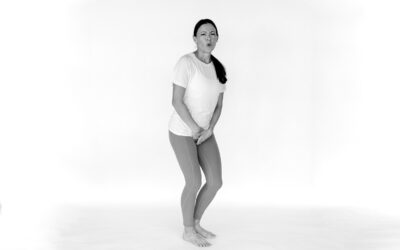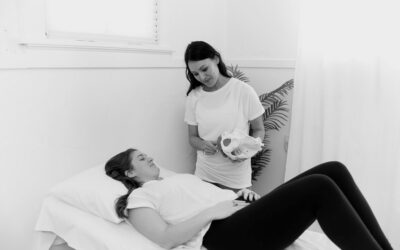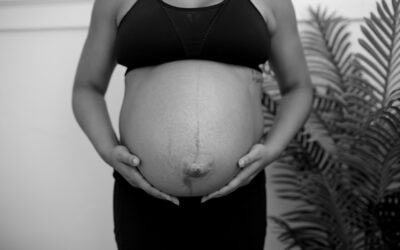If you just had a baby and are wondering how to balance hormones postpartum, you’re not alone!
In the moments following birth, many new mothers experience a range of emotions, including not only elation, happiness, excitement, and relief but also fear, worry, sadness and being overwhelmed. Adjusting to the postpartum period can be difficult and overwhelming.
To navigate this time, it is important to prepare for the challenges that may arise, know what’s normal and what’s not, and understand how hormonal changes can impact your physical and mental health.
Hormonal Imbalance Symptoms
Women experience often a hormonal imbalance during the postpartum period, leading to various mental and physical symptoms.
You may experience:
- Baby blues: Feeling weepy or blue for a few days after childbirth
- Severe postpartum depression
- Dry vagina: use lubrication
- Postpartum thyroiditis: temporary thyroid hormone gland inflammation affecting hormone levels, leading to mood changes, fatigue, anxiety, and weight fluctuations
- Lack of sleep and high cortisol levels can negatively impact hormone levels, resulting in pelvic floor muscle problems such as vaginal dryness.
Taking steps to balance your hormones postpartum is crucial for your overall well-being. Understanding these changes and adopting healthy habits can help you navigate this period smoothly.
What Hormones Are We Talking About, Exactly?
Postpartum hormone shifts are the body’s way of helping you adjust to the demands of motherhood. During pregnancy, estrogen and progesterone prepare the body for delivery. However, these hormones after birth decrease to help prepare you for breastfeeding and other post-birth caregiving tasks.
Progesterone and Oxytocin
The first hormone to decrease immediately following childbirth is progesterone, which helps regulate the menstrual cycle. This hormone helps your body adjust to the sudden decrease in gestation hormones, making it easier for you to bond with your baby. During this time, levels of the “love hormone” oxytocin surge, helping you feel connected to the baby and encouraging nurturing behaviors.
Estrogen and Prolactin
The next hormone to decrease is estrogen, which aids in lactation. Estrogen levels drop after delivery and remain low for several weeks while breastfeeding.
During this time, prolactin increases to maintain milk production. Prolactin stimulates breast milk production, and oxytocin continues to release during nursing sessions. By about three months postpartum, prolactin levels decrease while progesterone levels start to increase.
Cortisol
Cortisol, also known as the stress hormone, plays an important role in the postpartum period. It helps to regulate stress responses, mood, and energy levels, and can even influence breast milk production. During the postpartum period, cortisol levels tend to remain high, which can impact your overall health. High cortisol levels can lead to symptoms such as fatigue, anxiety, and postpartum depression.
Postpartum Hormones and the Pelvic Floor
Postpartum hormone levels are like a roller-coaster of surges and depletion. In the immediate days following birth your estrogen and progesterone levels, which were super high during pregnancy, take a nose dive – leading to nights sweats, chills, and unexplained crying.
As your breastmilk supply increases, prolactin, which is the hormone responsible for breast milk production, increases and estrogen levels continue to decrease gradually over time.
Hormone levels, particularly estrogen and progesterone, can significantly impact the strength and elasticity of the muscles in this area. Estrogen helps increase blood flow to the pelvic area and encourages new tissue growth, while progesterone helps relax the pelvic floor muscles, making them more pliable. These hormones also affect the production of collagen and elastin, which are essential for maintaining the strength of the pelvic floor. Hormone fluctuation can lead to weakened or overactive pelvic floor muscles.
Decreased estrogen levels lead to hair loss, low libido, and contribute to anxiety and depression. Keeping your medical provider informed of these changes if you feel overwhelmed, constantly sad or a harm to yourself or your baby is key. Support is available and necessary to navigate these challenging times. Exercise, nutrition, and adequate sleep are all important for keeping hormones balanced.
How to Balance Hormones Postpartum
The postpartum period and decreased estrogen levels can also negatively impact the health of your pelvic floor. Low estrogen levels can contribute to vaginal dryness, difficulty holding in urine, frequent urination and painful sex. Knowing how hormone changes can affect your body, which can last months postpartum, can help you understand their impact on your body and better care for yourself.
Treatment options include:
- Kegel exercises to prevent urinary incontinence
- Moisture and lubrication products for vaginal dryness
- Regular exercise to promote blood flow to the pelvic floor
- Hormone replacement therapy (HRT) is one solution for some women, but needs to be discussed with your medical provider.
Additionally, adopt healthy habits like a balanced diet with healthy fats, regular exercise, and prioritizing rest. Seek out proper healthcare to manage postpartum hormonal imbalances, like working with a perinatal therapist, pelvic floor therapist, or nutritionist. This can help reduce the chances of pelvic floor problems and support overall well-being during the postpartum period.
When Do Hormones Level Out Postpartum?
As months pass, your hormones will continue to fluctuate until they return to their pre-pregnancy state. This can take anywhere from three to six months. Any changes you experience during this transitional period may cause you to feel overwhelmed or anxious. This is normal!
As the body adjusts, prolactin levels will increase as your milk supply increases. During lactation, prolactin helps keep milk production going while inhibiting ovulation. This is why breastfeeding mothers don’t ovulate or have a menstrual cycle until after weaning.
It can take up to two years for a woman’s hormone levels to return to pre-pregnancy levels. As a result, you might feel a wide range of emotional and physical symptoms during this time. These can include anxiety, depression, mood swings, and fatigue.
The postpartum period can last for weeks, months, or even years, depending on your recovery process. You may feel more energized as your pregnancy hormones start to level out and become more balanced.
At-home Postpartum Pelvic Floor Exercises
For additional support in how to balance hormones postpartum, start the Postpartum Program in the V-Hive membership platform! The V-Hive offers expert advice, resources, and a supportive community to help you manage your postpartum health effectively. Get started now with 7 days totally free!




